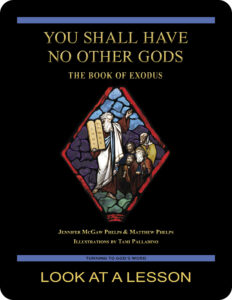tabernacle
 Tabernacle, sometimes called the tent of meeting to describe where the Israelites worshiped the Lord, is one of the major focuses in the Old Testament book of Exodus. This tent was significant to the Israelites because that’s where God dwelt. The Hebrew word mishkan is used to refer to the tabernacle. It means “dwelling place” or “tent.” The common translation as tabernacle comes from the Latin word tabernaculum, which means “tent” or “hut.” Etymologically, the tabernacle has two important features. First, it is a tent, and second, God makes his dwelling there.
Tabernacle, sometimes called the tent of meeting to describe where the Israelites worshiped the Lord, is one of the major focuses in the Old Testament book of Exodus. This tent was significant to the Israelites because that’s where God dwelt. The Hebrew word mishkan is used to refer to the tabernacle. It means “dwelling place” or “tent.” The common translation as tabernacle comes from the Latin word tabernaculum, which means “tent” or “hut.” Etymologically, the tabernacle has two important features. First, it is a tent, and second, God makes his dwelling there.
The Jewish concept of God’s dwelling place has been forced to evolve over time. When the Israelites entered the Promised Land and constructed a temple to the Lord, God’s dwelling place shifted from a tent to a temple. Then with the loss of the ark of the covenant, God no longer strictly speaking could be said to be dwelling in the tabernacle or temple, at least not in the same way as before. The concept of the tabernacle then became disenfranchised and was open to Christian reinterpretation. This reinterpretation disregards the tent aspect in favor of focusing on the tabernacle as any place where God makes his dwelling.
The word tabernacle as a noun makes its first biblical appearance in the Old Testament as the tent of meeting. In the prologue to the Gospel According to John (NABRE), the Evangelist borrows the idea, using the word tabernacle as a verb to indicate that the New Testament dwelling place of God is in Jesus Christ.
tabernacle used as a verb
Most people in the English-speaking world would never consider using the word tabernacle as a verb. The Gospel According to John 1:14 (NABRE) contains one of the most profound statements of the Incarnation: “And the Word became flesh and made his dwelling among us.” This familiar and beautiful phrase also is one of the preeminent examples of how a tremendous amount of meaning can be lost in translating from Greek to English.
The word translated as “made his dwelling” comes from the Greek verb σκηνόω (skenoo). This verb is related to the word σκηνή (skene), which means “tent.” In the verb form, then, skenoo literally means “to tent” or more helpfully “to pitch a tent.” A much better translation, then, of the above passage is “The Word became flesh and pitched his tent among us.”
Why is this distinction important? There’s not a great deal of difference, after all, between making a dwelling and pitching a tent, especially if we assume (incorrectly) that at this time people tended to live in tents. At this point, it’s worth noting that in the Septuagint (the Greek translation of the Hebrew Scriptures) the tabernacle carried around in the desert by the people of Israel was referred to using the word skene. This association with the tabernacle is critically important and is lost in modern renderings. In light of this connection, one final translation of our passage from the Gospel According to John 1:14 presents itself: “The Word become flesh and tabernacled among us.” The theological implications of this rendering are immense.
related topic: sojourn
you also may like our study of the book of Exodus
 You Shall Have No Other Gods: The Book of Exodus, a 28-lesson Catholic Bible study with an imprimatur, provides an in-depth look at how significant events in biblical history that occurred thousands of years ago to descendants of Jacob remain relevant and even critical for present-day Christians to understand. The deliverance of the Hebrews from slavery in Egypt and the giving of Ten Commandments are examined along with the development of Moses’ relationship to God. Click on the book’s cover to view a sample lesson.
You Shall Have No Other Gods: The Book of Exodus, a 28-lesson Catholic Bible study with an imprimatur, provides an in-depth look at how significant events in biblical history that occurred thousands of years ago to descendants of Jacob remain relevant and even critical for present-day Christians to understand. The deliverance of the Hebrews from slavery in Egypt and the giving of Ten Commandments are examined along with the development of Moses’ relationship to God. Click on the book’s cover to view a sample lesson.
 Click on the picture of the statue of Moses with horns (above) to learn more about Lost in Translation. A new entry is archived each Monday. Contact us to receive Lost in Translation by email every week. You may use any of the contact links on our website to ask Matthew a question.
Click on the picture of the statue of Moses with horns (above) to learn more about Lost in Translation. A new entry is archived each Monday. Contact us to receive Lost in Translation by email every week. You may use any of the contact links on our website to ask Matthew a question.

Leave a Reply
You must be logged in to post a comment.